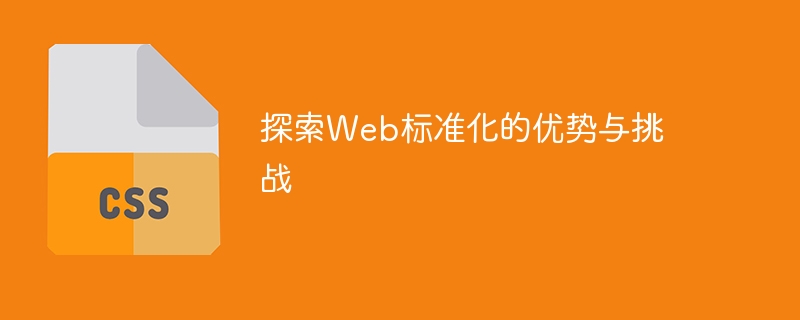Exploring the Pros and Cons of Web Standardization
Jan 13, 2024 pm 02:34 PM
In today's digital era, Web standardization has become the cornerstone of designing and developing Internet applications and websites. As network users and Internet technology continue to grow and develop, Web standardization plays an important role in enhancing user experience, improving development efficiency, and promoting cross-platform interoperability. However, although Web standardization is very attractive in concept, it still faces some challenges in the implementation process.
First, let’s explore the advantages of Web standardization. First, Web standardization can improve user experience. By following standardized design and development principles, websites and apps can provide consistent and predictable user interfaces, making them easier to get started with and use. This means that users do not need to relearn different interface layouts and operating methods, improving user efficiency and satisfaction.
Secondly, Web standardization can reduce development costs and improve development efficiency. Standardized technical specifications such as HTML, CSS, and JavaScript enable developers to write and maintain code more efficiently. By using standardized code, developers can reduce compatibility issues and save development time and costs. In addition, standardized code makes it easier to collaborate with other developers, improving team collaboration efficiency.
In addition, Web standardization also promotes interoperability. Standardized technical specifications enable more seamless data exchange and interconnection between different platforms and devices. This means users can access the same websites and apps on different devices and get a consistent user experience. This is especially important for businesses as they can more easily market their products or services to different markets and attract more users.
However, Web standardization also faces some challenges. First, the promotion and implementation of standardization requires time and resources. Many developers and organizations may not have sufficient knowledge and experience to understand and apply the principles and technical specifications of Web standardization. This requires education and training to improve their skill levels. In addition, some outdated browsers or platforms may not support the latest standardized technologies, causing additional compatibility issues for developers.
Secondly, the development of Web standardization is also restricted by commercial interests. Some companies may prefer to use proprietary or proprietary technology to limit user and developer choices. This may cause compatibility issues for some Internet applications and websites on different browsers and platforms, thereby reducing user experience and development efficiency.
Finally, Web standardization also needs to constantly update and adapt to changing Internet technologies and trends. As new technologies and equipment emerge, standardized specifications need to be updated in a timely manner to keep pace with the times. This requires close cooperation and coordination between standardization bodies and developers.
To sum up, Web standardization has obvious advantages in improving user experience, improving development efficiency and promoting interoperability. However, it still faces promotion and implementation challenges, requiring education, training, and ongoing technology updates to drive the development of standardization. Only by overcoming these challenges can Web standardization reach its fullest potential and bring a better experience to Internet users.
The above is the detailed content of Exploring the Pros and Cons of Web Standardization. For more information, please follow other related articles on the PHP Chinese website!

Hot Article

Hot tools Tags

Hot Article

Hot Article Tags

Notepad++7.3.1
Easy-to-use and free code editor

SublimeText3 Chinese version
Chinese version, very easy to use

Zend Studio 13.0.1
Powerful PHP integrated development environment

Dreamweaver CS6
Visual web development tools

SublimeText3 Mac version
God-level code editing software (SublimeText3)

Hot Topics
 Implementing Machine Learning Algorithms in C++: Common Challenges and Solutions
Jun 03, 2024 pm 01:25 PM
Implementing Machine Learning Algorithms in C++: Common Challenges and Solutions
Jun 03, 2024 pm 01:25 PM
Implementing Machine Learning Algorithms in C++: Common Challenges and Solutions
 Analysis of the characteristics and advantages of Go language
Apr 03, 2024 pm 10:06 PM
Analysis of the characteristics and advantages of Go language
Apr 03, 2024 pm 10:06 PM
Analysis of the characteristics and advantages of Go language
 Golang's single-threaded features and advantages
Mar 18, 2024 am 11:51 AM
Golang's single-threaded features and advantages
Mar 18, 2024 am 11:51 AM
Golang's single-threaded features and advantages
 An easy way to join a challenge on TikTok
Mar 28, 2024 pm 03:10 PM
An easy way to join a challenge on TikTok
Mar 28, 2024 pm 03:10 PM
An easy way to join a challenge on TikTok
 What are the advantages and disadvantages of deploying PHP applications using serverless architecture?
May 06, 2024 pm 09:15 PM
What are the advantages and disadvantages of deploying PHP applications using serverless architecture?
May 06, 2024 pm 09:15 PM
What are the advantages and disadvantages of deploying PHP applications using serverless architecture?
 Detailed explanation of the advantages and utility of Golang server
Mar 20, 2024 pm 01:51 PM
Detailed explanation of the advantages and utility of Golang server
Mar 20, 2024 pm 01:51 PM
Detailed explanation of the advantages and utility of Golang server
 In-depth exploration of the advantages and value of Go language
Mar 27, 2024 pm 10:18 PM
In-depth exploration of the advantages and value of Go language
Mar 27, 2024 pm 10:18 PM
In-depth exploration of the advantages and value of Go language
 Explore the advantages and application scenarios of Go language
Mar 27, 2024 pm 03:48 PM
Explore the advantages and application scenarios of Go language
Mar 27, 2024 pm 03:48 PM
Explore the advantages and application scenarios of Go language







